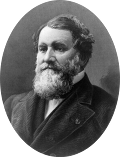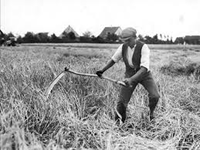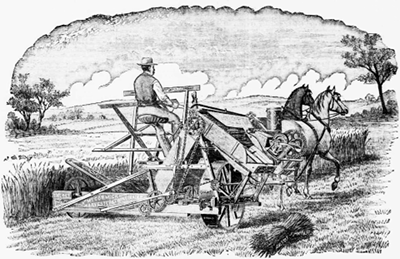Cyrus McCormick and the Invention of the Reaper
Cyrus McCormick was an American inventor who revolutionized farming with his invention of the reaper. 
He was born on Feb. 15, 1809 on a farm in Rockbridge County, north of Lexington, Va. He had a limited formal education but plenty of knowledge of farming and science. His father, also named Robert, was a blacksmith as well as a farmer and was also a tinkerer who himself held several patents for labor-saving farm machinery. Young Robert showed a keen mind for scientific improvement, inventing a lightweight cradle for carrying harvested grain when he was just 15. It was the reaper, though, that made him very famous. 
The usual process for harvesting grain was for a person carrying a large scythe to mow down grain and then for one or more people walking behind the reaper to tie the grain into bales, which would then be taken away on a cart. This process was very time-consuming and, as a result, limited the size of crop that a farmer could plant and still be able to complete the harvesting by the end of the season. McCormick's father had worked on such a device for 16 years, beginning when young Robert was 6. In 1831, when Robert was 22, he took over the project and had the final version ready to go in just six weeks. The reaper cut, threshed, and bundled grain at a speed that human threshers could not match. The horse-drawn reaper could cut six acres of oats in an afternoon; by contrast, doing the same amount of work at that time would have taken 12 human workers. 
McCormick got a patent for invention in 1834 but then, because of his family's ill fortune, tried to prop up its failing iron foundry. Nothing worked, and the family was very much in debt. McCormock started turning out reapers that he hoped to sell. It took awhile for his invention to catch on, and he spent a few years tinkering. Sales began to pick up in 1841; six years later, McCormick had to open a factory in Chicago in order to keep up with demand. He struggled to compete with other inventors in the field and was dismayed when his patent re-application was denied. He succeeded through a combination of innovation and marketing, employing novel practices like giving performance guarantees and offering lenient terms on credit purchases. McCormick enjoyed great success in 1851, winning the Gold Medal at London's Crystal Palace Exposition. He was later elected into the French Academy of Science. 
He lost his factory in the Great Chicago Fire of 1871 but quickly rebuilt and regained his momentum. The McCormick Harvesting Machine Company became the largest manufacturer of farm equipment in the U.S. He found sales success internationally as well, finding markets in faraway places like Russia and new Zealand. His invention encouraged others to innovate and create other labor-saving devices. He is sometimes referred to as the "Father of Agriculture." McCormick had married Nancy Flower in 1858. They had seven children together. McCormick suffered from paralysis for a few years at the end of his life and had handed over the running of his company to his son Cyrus, Jr., in 1880. McCormick died on May 13, 1884 at his home in Chicago. |
|
Social Studies for Kids
copyright 2002–2026
David White





